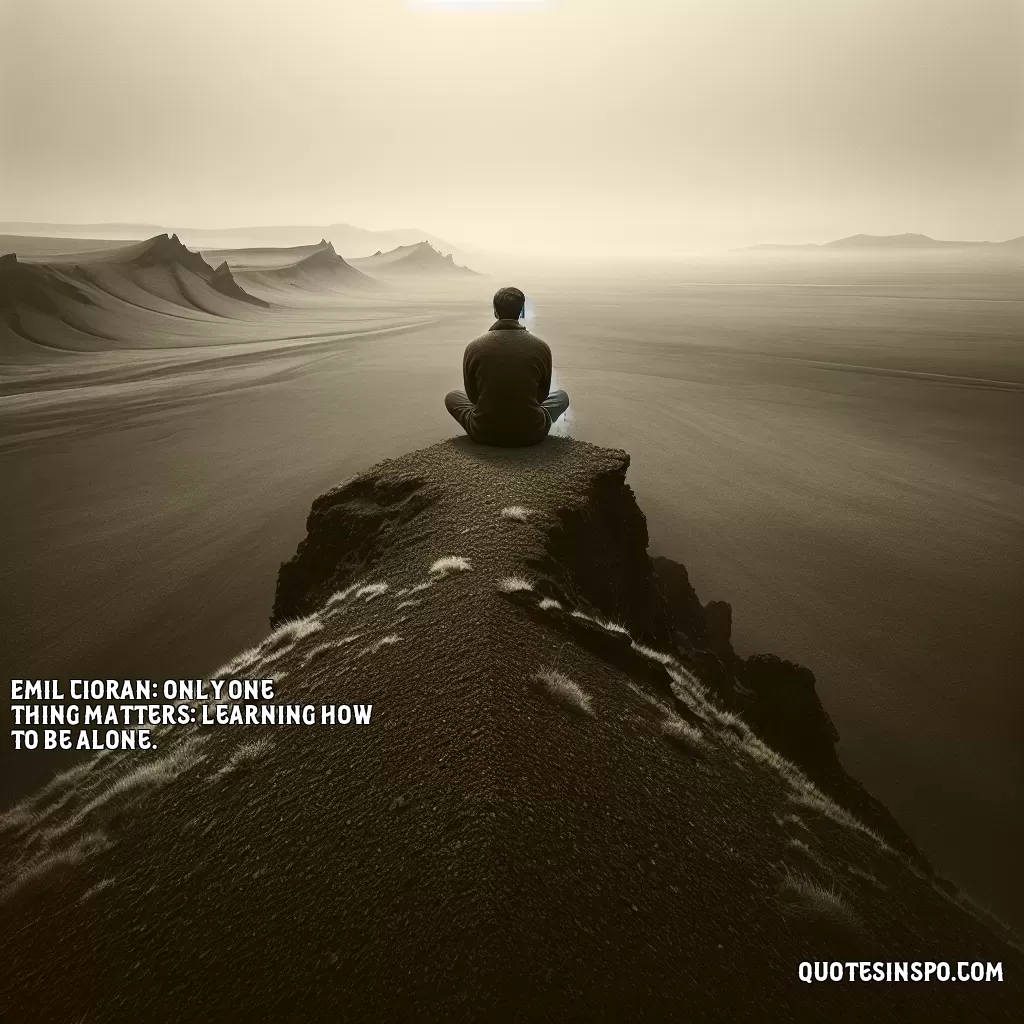
Emil Cioran: Only one thing matters: learning how to be alone.
Emil Cioran, a philosopher known for his profound reflections on existential themes, explores the intrinsic value of solitude with his assertion, "Only one thing matters: learning how to be alone." The essence of this quote is not merely advocating for physical isolation but emphasizes the psychological and existential significance of being at peace with one's own company. Learning how to be alone suggests the importance of self-sufficiency and self-reflection as essential components of personal development. In today's fast-paced society, people are often inundated with constant stimuli and the compulsion to be perpetually connected. Cioran's statement challenges this norm by advocating for the solitude necessary to cultivate self-awareness and inner peace. By learning to be alone, one is urged to confront their deeper thoughts, fears, and desires without distraction, leading to genuine introspection and self-discovery. Furthermore, Cioran implies that being comfortable in solitude is integral to forming authentic relationships. When we understand ourselves, independent of external validations or societal expectations, we can engage more meaningfully with others. This is because our interactions become rooted in genuine understanding rather than a dependency for companionship or approval. Moreover, solitude can be a source of creativity and inspiration. History offers countless examples of great minds who cherished solitary moments, using them as opportunities for innovation and contemplation. Ultimately, Cioran's quote challenges us to embrace solitude as a foundational element of a fulfilled life, urging us to find contentment within ourselves before seeking it in the external world. In this internal harmony, we find the essence of personal freedom and true existence.
Quote By: Emil Cioran
**Emil Cioran: A Life of Existential Inquiry**
Emil Cioran, born on April 8, 1911, in Rasinari, Romania, was a profound philosopher and essayist known for his poignant reflections on existence, despair, and the human condition. Cioran’s early education in Sibiu and Bucharest immersed him in a rich intellectual environment, where he was influenced by various philosophical traditions, including German idealism and existentialism. After completing his studies, he moved to Paris in 1937, where he spent the majority of his life, embracing the city's vibrant cultural landscape while distancing himself from his Romanian roots.
Cioran’s literary career is marked by a distinctive style that combines aphoristic writing with lyrical prose. His first major work, "On the Heights of Despair" (1934), reveals his deep existential angst and sets the tone for his future writings. Cioran's oeuvre often grapples with themes of nihilism, suffering, and the absurdity of life, reflecting his belief that despair is an inherent aspect of the human experience. His works, although initially met with limited attention, later garnered significant acclaim, capturing the interest of philosophers and literary figures alike.
Throughout his life, Emil Cioran wrote numerous books, including "The Trouble with Being Born" (1973) and "A Short History of Decay" (1949), where he delves into the futility of existence and the complexities of consciousness. His unique perspective, marked by a blend of humor and tragedy, invites readers to confront uncomfortable truths about life, death, and the nature of reality. Cioran's philosophical inquiries are steeped in a deep cynicism that resonates with readers who have navigated their crises of faith and identity.
Emil Cioran's impact extends beyond literature into the realms of philosophy and existential thought, and his works continue to influence contemporary discourse. He remained an enigmatic figure until his death on June 20, 1995, in Paris. Cioran’s legacy endures through his enduring writings, which challenge individuals to embrace the contradictions of existence and find meaning amid despair. His candid reflections ensure that he remains a vital voice in the exploration of human fragility and the search for understanding in an often bewildering world.